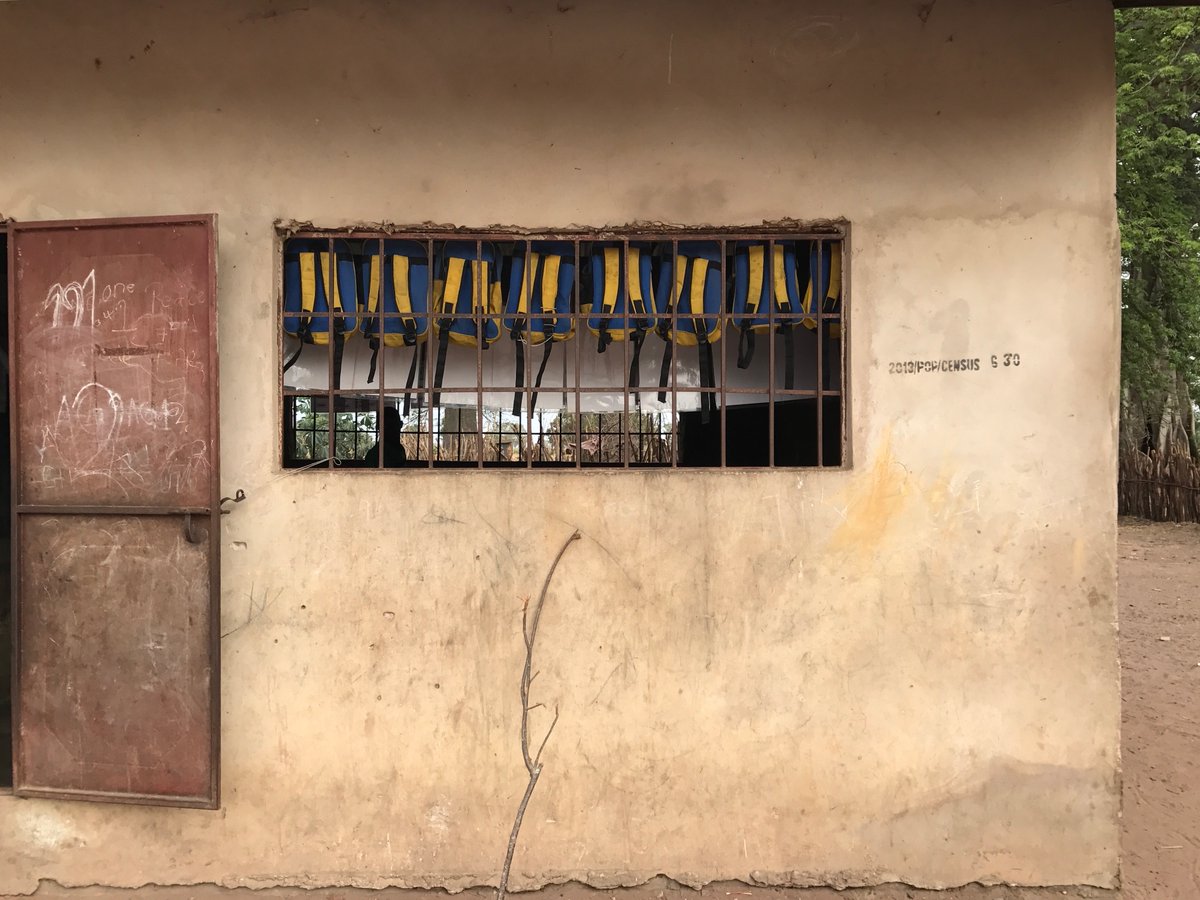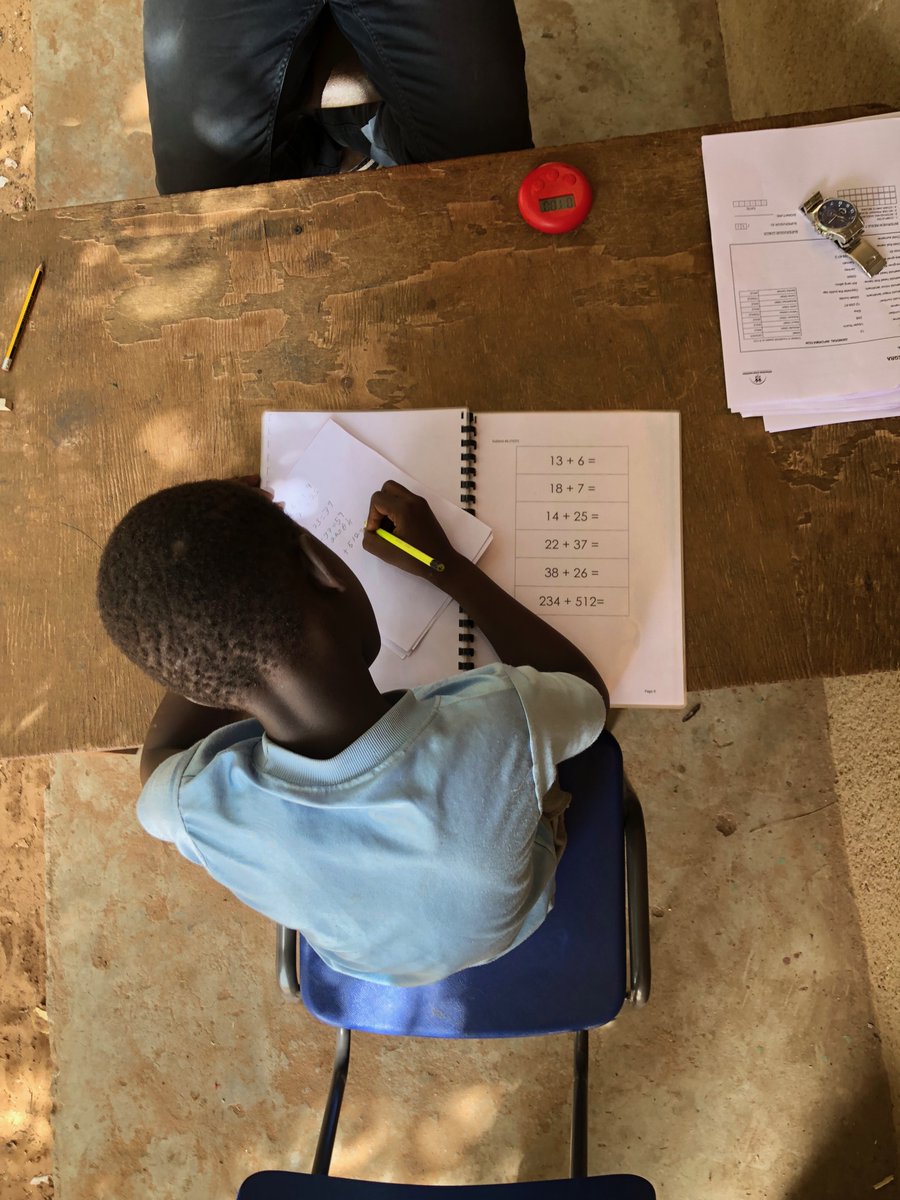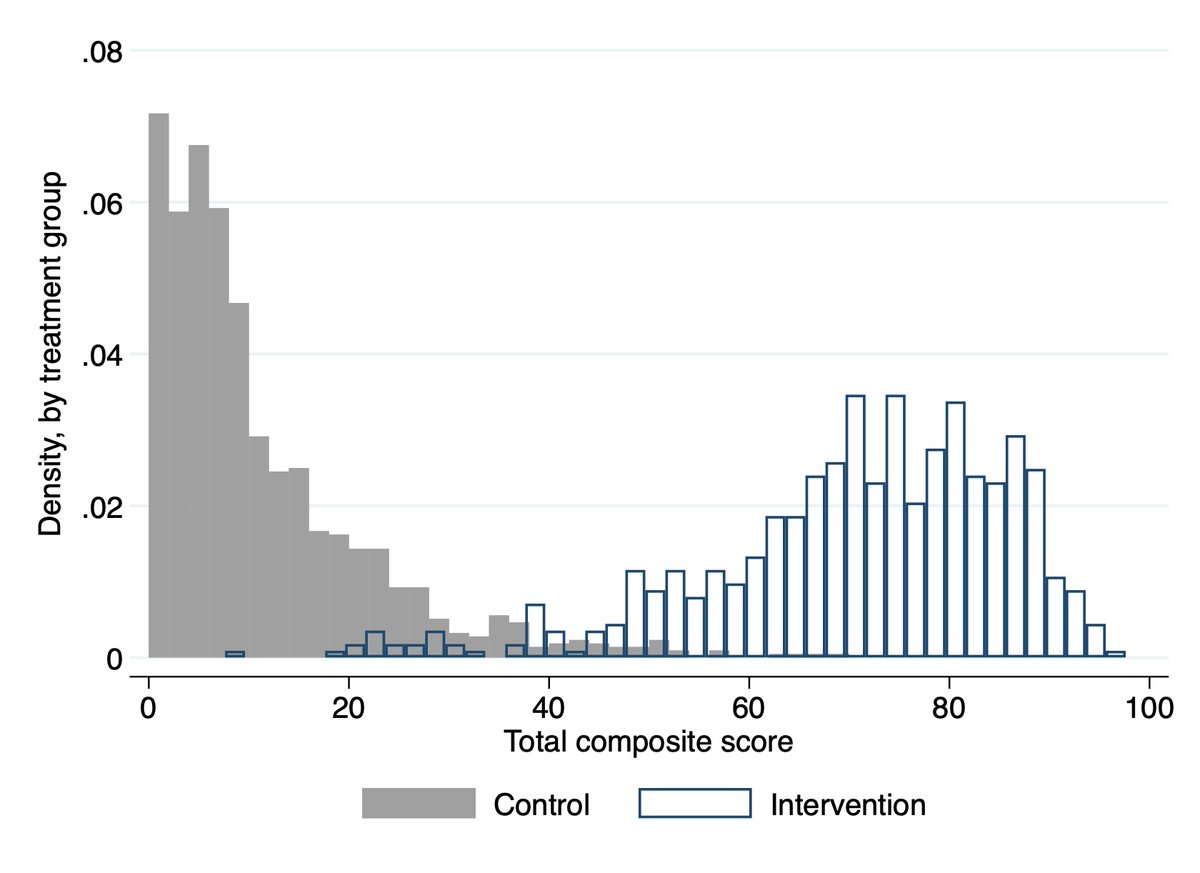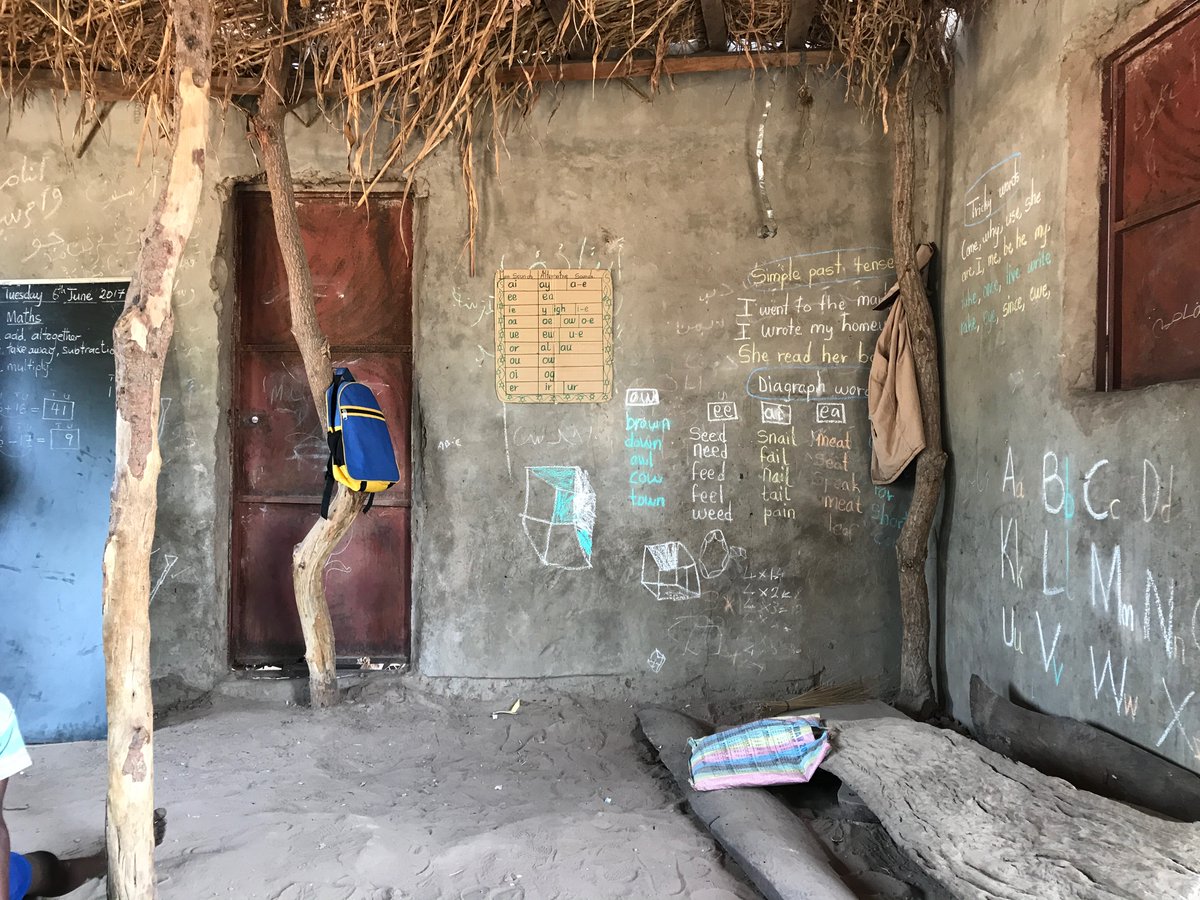
This🧵is about a tricky problem in education
The problem: despite growing global wealth and technological progress, there are extremely poor parts of the world where most children grow up illiterate and innumerate
We have two new papers showing that this can be changed
1/n
The problem: despite growing global wealth and technological progress, there are extremely poor parts of the world where most children grow up illiterate and innumerate
We have two new papers showing that this can be changed
1/n

Here are the papers, one in the Journal of Development Economics
(sciencedirect.com/science/articl…)
and one in the Journal of Public Economics (sciencedirect.com/science/articl…)
Our tl;dr message:
2/n
(sciencedirect.com/science/articl…)
and one in the Journal of Public Economics (sciencedirect.com/science/articl…)
Our tl;dr message:
2/n
The problem: most prior research finds that the best we could hope for from educational interventions in these places is small to medium learning gains
We show: with the right inputs, we can achieve much larger learning gains in these places than previously thought possible
3/n
We show: with the right inputs, we can achieve much larger learning gains in these places than previously thought possible
3/n
Specifically, we report two #RCT studies showing that
highly resourced, bundled interventions
can teach children in extremely poor and hard to reach places to read fluently and do basic math very well
Places where, otherwise, very few people will ever gain these skills
4/n
highly resourced, bundled interventions
can teach children in extremely poor and hard to reach places to read fluently and do basic math very well
Places where, otherwise, very few people will ever gain these skills
4/n

In this thread, I’ll give highlights from both papers
If you don’t make it to the end, a few talking points:
1) In many of these hard-to-serve parts of low income countries, the counterfactual is most children growing up without the ability to read or do simple arithmetic
5/n
If you don’t make it to the end, a few talking points:
1) In many of these hard-to-serve parts of low income countries, the counterfactual is most children growing up without the ability to read or do simple arithmetic
5/n
2) This is despite the fact that enrollment in school and attendance of teachers and children are often high
3) 100s of studies of #education in low income countries study interventions to change supply, #edtech, teacher incentives, student incentives, many other things...
6/n
3) 100s of studies of #education in low income countries study interventions to change supply, #edtech, teacher incentives, student incentives, many other things...
6/n
These can increase learning, but usually only modestly – often in the 0.1-0.4 SD range
These are summarized in the great systematic reviews and meta-analyses by @karthik_econ, @DaveEvansPhD, @Yuan_Fei_ @aganimian, Patrick McEwan, Paul Glewwe, Michael Kremer, many others
7/n
These are summarized in the great systematic reviews and meta-analyses by @karthik_econ, @DaveEvansPhD, @Yuan_Fei_ @aganimian, Patrick McEwan, Paul Glewwe, Michael Kremer, many others
7/n
But, as Lant Pritchett points out in his book “The Rebirth of Education”:
even combining several of these together, assuming their effects were additive
would yield only (relatively) small learning gains, leaving millions of children behind
8/n
even combining several of these together, assuming their effects were additive
would yield only (relatively) small learning gains, leaving millions of children behind
8/n

In these two papers, my coauthors and I answer the following question:
if we combine multiple interventions
in a way that educators think will make a difference, and has enough resources that it *can* really make a difference
How much good can we do?
The answer: a lot
9/n
if we combine multiple interventions
in a way that educators think will make a difference, and has enough resources that it *can* really make a difference
How much good can we do?
The answer: a lot
9/n
The first study is:
“How much can we remedy very low learning levels in rural parts of low-income countries? Impact and generalizability of a multi-pronged para-teacher intervention from a cluster-randomized trial in The Gambia”
sciencedirect.com/science/articl…
10/n
“How much can we remedy very low learning levels in rural parts of low-income countries? Impact and generalizability of a multi-pronged para-teacher intervention from a cluster-randomized trial in The Gambia”
sciencedirect.com/science/articl…
10/n
The Gambia is a small West African country; its per-capita GDP ranks in the bottom 20 of countries. Literacy is also very low: <64% for males, <48% for females
We worked in small villages in the interior of the country, where income and learning levels are even lower.
11/n

We worked in small villages in the interior of the country, where income and learning levels are even lower.
11/n


We ran a #RCT to evaluate an after-school multi-pronged intervention for kids in grades 1-3. The intervention
- hired people from nearby who were previously untrained as teachers (para teachers)
- trained them to teach remedial, after school classes using scripted lessons
12/n
- hired people from nearby who were previously untrained as teachers (para teachers)
- trained them to teach remedial, after school classes using scripted lessons
12/n

- monitored teachers, and student learning, closely
- provided enough resources (funding, support) to make the system work.
It ran for three years, at the end of which we tested children using standard literacy and numeracy tests
13/n
- provided enough resources (funding, support) to make the system work.
It ran for three years, at the end of which we tested children using standard literacy and numeracy tests
13/n

The headline result: we found tremendous gains in learning.
In the commonly used SD metric, this was 3.2 SD, but the SD is hard to use in this context because counterfactual learning is so low
Here are the test score distributions for intervention and control kids
14/n
In the commonly used SD metric, this was 3.2 SD, but the SD is hard to use in this context because counterfactual learning is so low
Here are the test score distributions for intervention and control kids
14/n

Broken down across the skills we measured – such as reading words, understanding short passages, doing two-digit subtraction, and solving word problems
we saw massive gains across the board
(the figure on the left is for math skills; the one on the left is for reading)
15/n

we saw massive gains across the board
(the figure on the left is for math skills; the one on the left is for reading)
15/n


The second study has a (mercifully) shorter title: “Large learning gains in pockets of extreme poverty: Experimental evidence from Guinea Bissau”
sciencedirect.com/science/articl…
It took place in rural parts of Guinea Bissau, another low-income West African country
16/n
sciencedirect.com/science/articl…
It took place in rural parts of Guinea Bissau, another low-income West African country
16/n
Guinea Bissau is in worse shape than Gambia
Since independence (1974) it has had several coups and much other strife; until 2018, no president had finished a full term
Outside of the capital there is no power grid, and the reach of other public services is similarly low
17/n
Since independence (1974) it has had several coups and much other strife; until 2018, no president had finished a full term
Outside of the capital there is no power grid, and the reach of other public services is similarly low
17/n

This, of course, includes education.
As a result, learning levels there are also extremely low.
A national study of education in the country that some of us ran (nber.org/papers/w18971) found even lower literacy than in the Gambia: 24% for males, < 3% for females
18/n
As a result, learning levels there are also extremely low.
A national study of education in the country that some of us ran (nber.org/papers/w18971) found even lower literacy than in the Gambia: 24% for males, < 3% for females
18/n
Because service provision is so low, we studied schools run in lieu of the government, instead of after school remedial lessons as in Gambia
We hoped to also study a para teacher model, similar to that studied in the Gambia paper
Unfortunately, we ran into some trouble...
19/n
We hoped to also study a para teacher model, similar to that studied in the Gambia paper
Unfortunately, we ran into some trouble...
19/n
You can find details on what happened in the paper and its appendix, copied in the images below
The short story: we hired para teachers, trained them, and then they quit
Starting over, we changed the model, hiring trained teachers to live and teach in study villages
20/n


The short story: we hired para teachers, trained them, and then they quit
Starting over, we changed the model, hiring trained teachers to live and teach in study villages
20/n



Otherwise, the intervention was similar, using scripted lessons, extensive monitoring, and providing adequate resources to support operations
It began with a year of pre-primary to get kids up to speed with Portuguese, then three academic years of skill-focused learning
21/n
It began with a year of pre-primary to get kids up to speed with Portuguese, then three academic years of skill-focused learning
21/n
Here, we found tremendous results:
after four years of intervention, 60 percent of kids in treatment villages could read fluently, with comprehension
compared to 0.1% in the control group!
(overall distributions again shown below)
22/n
after four years of intervention, 60 percent of kids in treatment villages could read fluently, with comprehension
compared to 0.1% in the control group!
(overall distributions again shown below)
22/n

Together, our studies show two main things:
One, in the absence of external intervention, the vast majority of people in these places will grow up illiterate and innumerate
Two, if we want to, WE CAN CHANGE THIS!!!
(we are really excited about that second message)
23/n
One, in the absence of external intervention, the vast majority of people in these places will grow up illiterate and innumerate
Two, if we want to, WE CAN CHANGE THIS!!!
(we are really excited about that second message)
23/n

The “trick” is that it’s not cheap
The para-teacher intervention in the Gambia cost $242 per kid year
The intervention in Guinea Bissau cost $425 per kid per year
While both interventions are highly cost-efficient, they are well beyond the means of local government
24/n
The para-teacher intervention in the Gambia cost $242 per kid year
The intervention in Guinea Bissau cost $425 per kid per year
While both interventions are highly cost-efficient, they are well beyond the means of local government
24/n

Big picture take-aways:
It is hard to fix the problem of low learning in extremely poor, remote parts of the developing world.
But it is possible. And it is very, very important.
25/n
It is hard to fix the problem of low learning in extremely poor, remote parts of the developing world.
But it is possible. And it is very, very important.
25/n

Why is it important?
These places are at the far left tail of the distribution of both income and learning
Helping them must be a big part of global efforts to fight inequality, promote #Globaljustice #GlobalDevelopment, reach #sdg4 (we see you, #EdTwitter #EduTwitter)
26/n
These places are at the far left tail of the distribution of both income and learning
Helping them must be a big part of global efforts to fight inequality, promote #Globaljustice #GlobalDevelopment, reach #sdg4 (we see you, #EdTwitter #EduTwitter)
26/n
Also, because literacy and numeracy can be transformative for health, economic and political activity, and a host of other downstream outcomes
This has major implications for the life, death, and flourishing of millions of people in these places
27/n
This has major implications for the life, death, and flourishing of millions of people in these places
27/n

There are many other reasons, but this thread is already rather long – if you’re looking for more, please read the papers:
Gambia: sciencedirect.com/science/articl…
...
28/n
Gambia: sciencedirect.com/science/articl…
...
28/n
and Guinea Bissau: sciencedirect.com/science/articl…
And, of course, email me / us with questions. The “we” are the coauthors and other contributions mentioned in each.
29/n
And, of course, email me / us with questions. The “we” are the coauthors and other contributions mentioned in each.
29/n
We are immensely grateful to a group too long to mention here (see the paper acknowledgements!). I (Alex) want to express my gratitude to my communities, friends and family in Gambia, Bissau, London, Indiana, New York @TeachersCollege @EPSAatTC @Columbia_CDEP @ColumbiaCPRC
30/n



30/n




• • •
Missing some Tweet in this thread? You can try to
force a refresh







